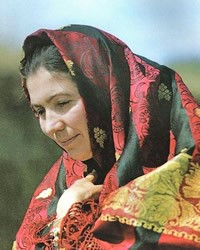Akhvakh in Russia

Photo Source:
Anonymous
|
Send Joshua Project a map of this people group.
|
| People Name: | Akhvakh |
| Country: | Russia |
| 10/40 Window: | No |
| Population: | 6,800 |
| World Population: | 6,800 |
| Primary Language: | Akhvakh |
| Primary Religion: | Islam |
| Christian Adherents: | 0.00 % |
| Evangelicals: | 0.00 % |
| Scripture: | Translation Started |
| Ministry Resources: | No |
| Jesus Film: | No |
| Audio Recordings: | No |
| People Cluster: | Caucasus |
| Affinity Bloc: | Eurasian Peoples |
| Progress Level: |
|
Introduction / History
The Akhvakh, who speak their own distinct language, live in 9 major villages or towns in the mountainous region of west central Dagestan, and also in several Akhvakh enclaves in Dagestani urban areas. Before 1930, Russia considered them to be a distinct ethnic group. Since then, Russia has combined them into the Avar ethnic group. The Akhvakh speak their own distinct language, Akhvakh and maintain their distinct culture.
What Are Their Lives Like?
The Akhvakh people live in a remote area. They make their living by farming and raising livestock. They suffer high rates of alcoholism like many other peoples in this region.
What Are Their Beliefs?
As do many of the peoples of Dagestan, they practice widespread folk Islam which exists alongside official Islam and its Five Pillars. One Dagestani scholar suggests that such animistic folk Islamic practices are especially strong among the Akhvakh, although not much less so among the other 33 language groups of Dagestan. An Akhvakh mullah might write Arabic Koranic verses with ink pen on a piece of paper, soaked the paper in a cup of water until the ink dissolved in the water and then had the ill person drink the water, accompanied by memorized Arabic incantations.
What Are Their Needs?
There are very few known Christ followers among the Akhvakh people. This people group needs many to show them the way of Philip the Evangelist (Acts 8), who demonstrated the power of the Lord over destructive spirits.
Prayer Points
Pray for the few Akhvakh Christian believers to be salt and light to their families and community.
Pray for translation efforts to be accurate and for materials to be widely distributed. In recent years the Lord's Prayer has been translated into the unique Akhvakh language.
Pray for Oral Bible Translation work in the language.
Pray for Akhvakh people to have dreams and visions of the risen, victorious Christ, and share their experience with others. May it lead to openness to the only Savior.
Pray for the Akhvakh people to be protected from the widespread violence in their part of the world.